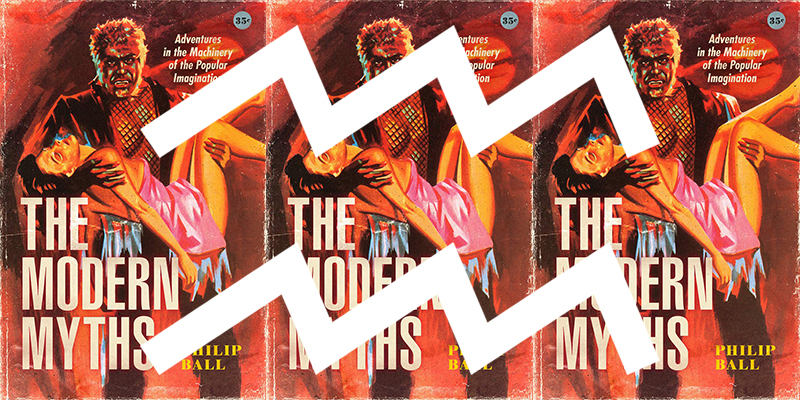
Philip Ball believes we have modern myths that we live by. And, in this new book, Ball sets out to argue we pattern our lives around the wisdom of Robinson Crusoe, the mistakes of Frankenstein, the bi-polar Dr. Jekyll, the hungers of Dracula, the terror of Martians (and other invaders), the analytical Sherlock Holmes, the vigilantism of Batman, and the prospect of more modern myths to come.
Ball makes his case for each modern myth chapter by chapter. He provides in-depth histories of the source of the myth, then extends the influence of the myth on the wider culture. For example, after giving a grand account of how H. G. Wells’s The War of the Worlds came about, Ball goes into the Orson Welles radio extravaganza of Orson Wells that terrified the country. He even provides a photo of Orson Wells with H. G. Wells in 1940. In addition, Ball includes other books, movies, radio programs, etc. that spun off of The War of the Worlds including reimagining like Tim Burton’s Mars Attacks!
If you’re interested in popular culture and modern myths, this is the book for you! GRADE: A
TABLE OF CONTENTS:
1. How can a Myth be Modern? — 1
2. John Bull on a Beach: Robinson Crusoe (1719) — 36
3. The Reanimator: Frankenstein (1818) — 69
4. Unchaining the Beast: The Strange Case of Dr. Jekyll and Mr. Hyde (1886). — 130
5. The Body and the Blood: Dracula (1897) — 165
6. Who Shall Dwell in these Worlds: The War of the Worlds (1897) — 223
7. Reason Wears a Deerstalker: The Sherlock Homes stories (1887-1927) — 275
8. I Am the Law: Batman (1939-) — 311
9. Myths in the Making, Myths to Come — 351
10. The Mythic Mode — 370
Acknowledgments — 383
Notes — 385
Bibliography — 407
Index — 415
It does sound interesting, though I’m not sure I want to read it. I do love the cover.
You always keep us up to date on books we otherwise are unlikely to have heard of.
Jeff, I think I first learned of THE MODERN MYTHS through a review in the Wall Street Journal.
I agree with Jeff. Although I probably won’t read it, I appreciate you bringing it to our attention. And the thesis makes sense.
Patti, I found MODERN MYTHS fascinating and different. Well worth a look!
I think we’re living in an era of dangerous myths—take QAnon for example, or all the Facebook myths about how viruses transmit and mutate, how masks work, how votes are counted, how elections are certified, etc.
All too true…many of our current myths are far less entertaining that the literary creations…and always have been…
Todd, the current myths that are “going viral” on Social Media frequently are outlandish and incredible. But, millions of gullible people believe them!
Deb, I agree that dangerous myths exist today. The problem is how do you stop them from circulating on Social Media?
Wells didn’t use his radio program to terrify the country, as you state, instead his broadcast terrified the country. Big difference.
Rick, once again WORDPRESS and its evil Spellchecker are at fault. I should have checked my work more carefully knowing WORDPRESS likes to change my words without asking me for permission.
I don’t think the spellchecker is to blame for not knowing that Orson Welles gets two “e”s and H.G. Wells only one. Gotcha!
Art, I blame the WORDPRESS spellchecker demon for all the gaffs on my blog! Thanks for the heads up. I’ll make the correction.